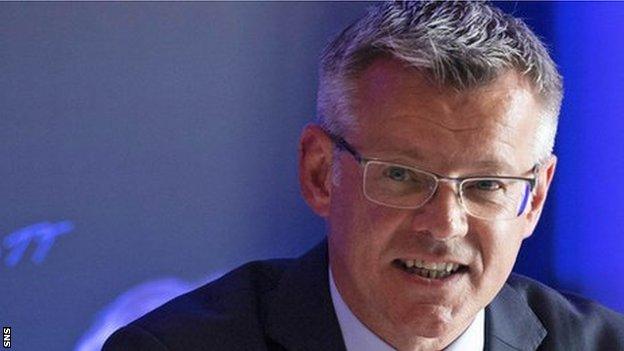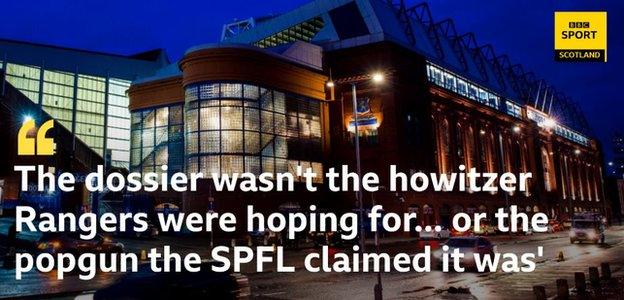Rangers & the SPFL: 'Scottish football is at war with itself'
- Published

Stewart Robertson has called for an independent inquiry into the SPFL
There's an optical illusion that most of us will have seen, a famous drawing that either reveals the image of a vibrant young woman or a withered old hag depending on which way your brain works.
In many senses, Scottish football is a giant optical illusion, too.
Some people look at a dossier and see one thing, others look and see another. The polarisation is remarkable. Each side is convinced that they're right and that the other lot is wrong - and wild horses wouldn't change their mind.
The latest manifestation of this is the case against the SPFL as handed down by Rangers on Thursday.
Depending on what colour eyes you're looking through, it's either a shameful waste of time for which the Ibrox club should be mocked and censured, or a weighty examination of myriad failings in the corporate governance of the league over the past month or so.
Whatever side you happen to be on, there is an inescapable truth about all of this: Scottish football is at war with itself. Maybe that's a permanent state, but it feels like we've now entered new territory.
We all love the knockabout craziness of the game in this country, the madcap moments when decapitated pigeons crash to earth during a Queen's Park match or when the president of Albania announces himself as a Celtic fan, but that innocent surreality seems a while ago now.
What's happening is nasty. Rangers are tearing strips off the SPFL and the SPFL is tearing strips off Rangers. Two clubs are alleging bullying on the part of two other clubs. There is rancour and bitterness galore.
'How do we come back & re-establish trust?'
Having gone to town on the SPFL board on which he sits, it's impossible to see how Stewart Robertson, the Rangers managing director, can now stay involved in the governing body. He's lacerated its credibility, calling the leadership the worst he has known in many different involvements at that level.
According to one newspaper,, external a league source is saying that Robertson's position on the SPFL board is not only untenable but that he may also face accusations of breach of company law, given what's in the report. There are suggestions elsewhere that some allegations against certain individuals in the dossier might be deemed libellous.
On radio on Thursday night, Robertson appeared to stand by every last word. This is a labyrinthine mess.
There are 100 pages in this Rangers report alleging sins of omission, bad-faith governance, disingenuous behaviour and misleading comments on the part of various member of the SPFL board, but mostly on the part of chief executive Neil Doncaster, who they are quite clearly gunning for.
It concludes with an opinion from Rangers' advocate, Eoghainn MacLean, that Doncaster may have breached his duty as director and chief executive and that Rangers, and other clubs, may be incapable of having trust and confidence in his leadership.
The advocate suggests that there would be a reasonably good prospect of obtaining from the courts an order for Doncaster's removal. Rangers have a question to ask themselves now. Do they keep going? Do they go down the legal route as is faintly suggested in their documentation, or do they back away once the call for an independent inquiry fails next week, as it surely will?
As one Premiership chief executive said on Thursday evening: "How do we all come back from this and re-establish trust? God only knows."
Neither howitzer nor popgun
The dossier wasn't the howitzer Rangers were hoping for, but neither was it the popgun that the SPFL laughably claimed it to be in their statement of Thursday morning.
In this game of politics, Rangers made a mistake by hyping what they had. Calling for the suspension of Doncaster and SPFL lawyer Rod McKenzie without simultaneously publishing the information that supposedly damned them was an unwise play - and an unfair slight against both men.
It only ratcheted up the pressure on Rangers to back up their fighting talk with knockout evidence. They've raised a huge amount of questions and have cast a lot of doubt about the performance and motives of the SPFL executive, but it's not a piece of work that will put Doncaster on the canvas and keep him there.
It would have been interesting to see the reaction to Rangers' dossier had they been more stoic in the preamble. It's a serious document and had they published it without fanfare then its impact might have been greater, which would in turn have proven more troublesome for the people at the heart of it.

In itself, it won't bring about Rangers' stated aim of an independent inquiry into the performance of the SPFL board over the past month - needing 75% backing from clubs, the bar is set almost impossibly high - but it raises issues that the governing body should not be allowed to blithely dismiss.
Rangers' narrative paints Doncaster and much of his executive as single-mindedly determined to get a yes vote in the controversial resolution to the end the leagues. Doncaster is portrayed as a man who wants that resolution to pass and who needs it to. He is represented as someone who is going to do whatever he needs to do to get the result he wanted.
All other options were presented as cul-de-sacs. Further advances or loans to cash-strapped clubs to allow some time to think? No. The only road ahead, as presented by Doncaster and McKenzie, was to vote for their resolution and bring the season to a conclusion.
What's alleged here is that Doncaster, while making his board aware of £10m of potential liabilities due to broadcasting partners if the season ended prematurely, did not then inform the clubs of this possibility before they voted to end the season early.
He referenced possible clawback from broadcasters in the event of the league being voided - thereby effectively wiping the voiding option from the agenda - but didn't spell it out as a realistic danger in the event of a yes vote.
Rangers state that the warning was not given to clubs about the £10m rebate that might be due to Sky and BT Sport. Rangers also state that when the briefing paper was issued to clubs before the resolution vote it was not approved by the SPFL board. Rather, it was sent out by Doncaster without the board's imprimatur.
"That could be a serious problem," said one club source on Thursday.
Contradiction for Doncaster to clear up
From the moment Rangers issued their statement on this on 11 April, the allegation of bullying and coercion has been a mainstay of the debate. Rangers never accused Doncaster or McKenzie or any other board member of bullying - a point lost on some - but said there had been suggestions of bullying and coercion in the voting process.
They gave light to that in the dossier - and named the people that have had the charges levelled at them. Doncaster is not one of them; nor is McKenzie. The chief executive has always said that nobody ever came to him with allegations of untoward behaviour. Rangers are disputing that.
They have referenced a WhatsApp group for chairmen and chief executives of Championship clubs set up in the days before the vote. In that group it is remarked that bullying has gone on among Championship clubs.
The dossier claims these allegations were reported to Doncaster by representatives of Dundee and Inverness but that Doncaster never raised the incidents with the the SPFL board. This suggested contradiction needs to be cleared up by Doncaster since a charge is being levelled at him here.
There are many others. There's the letter to Uefa on 4 April that gives the impression of Doncaster prejudging the outcome of the resolution six days later. There's the behaviour of the SPFL board surrounding the Dundee vote and a timeline of who spoke to who and when that still does not add up. The Deloitte report comes under scrutiny. There are multiple pages questioning issues around league restructuring.
Because there is no indisputable evidence of corruption - a bar that got higher the longer Rangers left it before publishing what they had - then it's easy for the SPFL board and its supporters to look at this in the narrowest of terms and to shoot it down, as they already have in a short statement and will attempt to do again in a much longer one.
The SPFL statement on Thursday was an obvious exercise in trying to discredit the report. There was more where that came from on Friday lunchtime. This is the game. This is where we're at. A revealing chapter on the inner-workings of the league body has been written and it makes for troubling and at times grim reading.
On Thursday there was a plaintive cry from the leader of a Premiership club who is a neutral in this fight and who'd just finished reading the dossier.
"We have to be better than this," he said. "When football returns, we can't go on the way we are."
